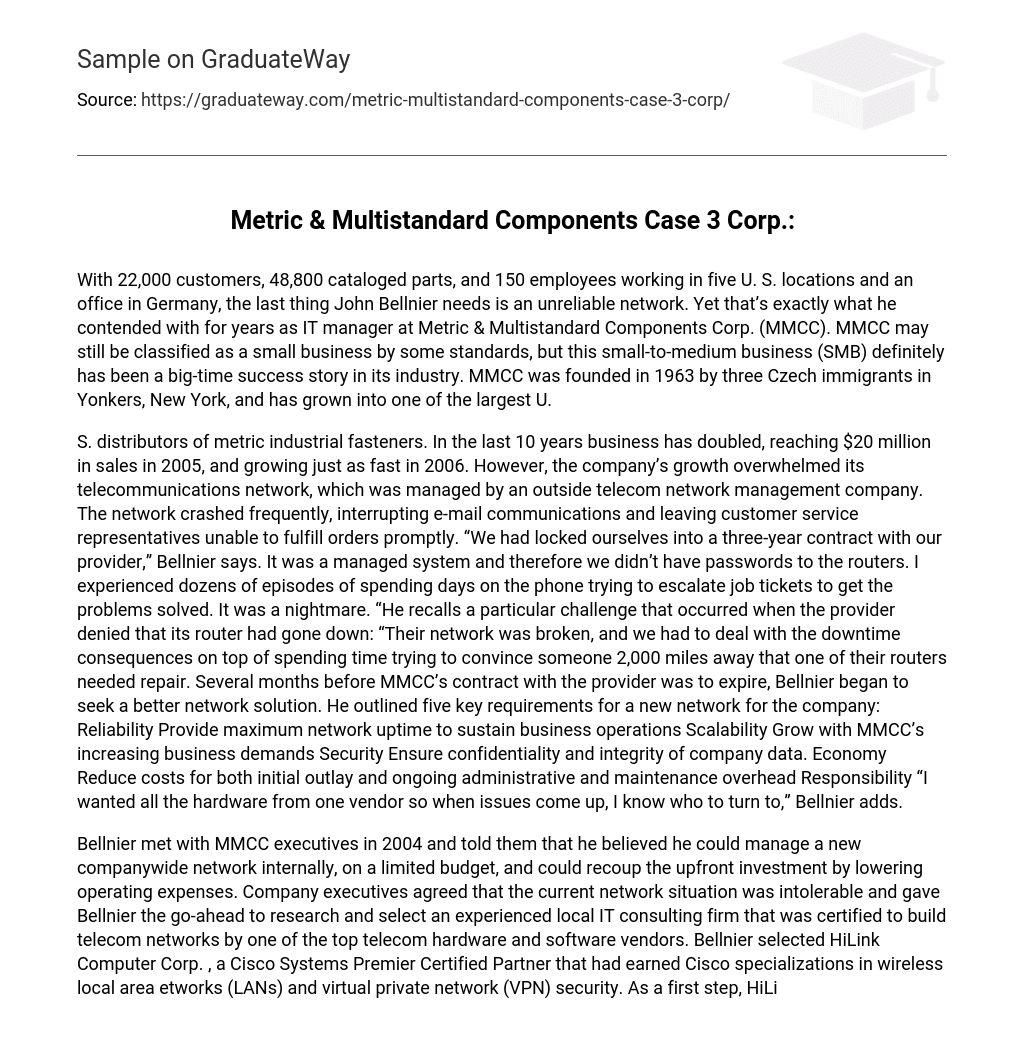In his role as IT manager at Metric & Multistandard Components Corp. (MMCC), John Bellnier was confronted with the task of managing a network that was not dependable. MMCC, although classified as a small business, has experienced considerable accomplishments in its industry as a small-to-medium-sized business (SMB). Established in 1963 by three Czech immigrants in Yonkers, New York, MMCC has grown to become one of the leading companies in its sector. It boasts 22,000 customers, 48,800 cataloged parts, and employs 150 individuals across five U.S. locations and an office in Germany.
S. distributors of metric industrial fasteners have experienced significant business growth in the past decade, with sales reaching $20 million in 2005 and continuing to rapidly increase in 2006. However, this growth strained their telecommunications network that was managed by an external company. The network frequently crashed, causing email communication interruptions and order fulfillment delays. Despite being bound by a three-year contract with the provider, resolving these issues proved challenging due to a lack of router access passwords for problem escalation and resolution. This situation became a nightmare for the company, especially when the provider denied any malfunctioning routers. As the contract expiration date approached, CEO Bellnier sought a better network solution with five key requirements: reliability, scalability, security, cost-effectiveness (reducing initial investment and ongoing maintenance overhead), and sourcing hardware from a single vendor for simplified troubleshooting.
In 2004, Bellnier discussed with MMCC executives his belief that he could internally manage a new companywide network within a limited budget and recover the upfront investment by reducing operating expenses. The executives agreed that the current network situation was unacceptable and allowed Bellnier to find a certified local IT consulting firm that specialized in building telecom networks. Bellnier chose HiLink Computer Corp., a Cisco Systems Premier Certified Partner with expertise in wireless LANs and VPN security. HiLink assessed MMCC’s existing network and gathered information on business goals and requirements. Impressed with HiLink, company management authorized Bellnier to request a formal project proposal. HiLink’s consulting engineers, led by Jim Gartner, the Business Development Manager, suggested MMCC establish a secure network foundation using VPN links between sites. The proposed network blueprint utilized Cisco integrated services routers and security appliances, aiming to provide transparent remote access to necessary devices, enhance network control, and improve performance.Hi-Link demonstrated to Bellnier how a secure network foundation operates to automate routine maintenance, monitor the network, and notify IT staff of any security or performance issues. Bellnier approved Hi-Link’s network plan and delivered a formal presentation outlining the proposal to company management. After discussing the financial costs, risks, and benefits of Hi-Link’s plan, MMCC executives agreed to the proposal and established the following primary project objectives: The objective is to establish a business network for MMCC that offers greater reliability, security, and scalability while reducing costs compared to the current externally managed network. The strategy is to design an IP (Internet Protocol) network with advanced technologies that ensure high availability and efficient network and security management. Additionally, this network should be manageable by a small IT department.
Hi-Link utilized virtual private network technologies to securely connect remote offices and users, enabling company expansion. Following the signing of the consulting contract, Hi-Link collaborated with Cisco and the local telecom company to install necessary telecommunications lines for the new network. By efficiently working at advantageous times, Hi-Link effortlessly completed the deployment of preconfigured Cisco routers, switches, and other telecommunications hardware within a week. They effectively managed the details associated with the local telecom company, Internet providers, and project management. The secure network implementation resulted in various benefits for MMCC, including the immediate elimination of network congestion. Additionally, there were significant improvements in network bandwidth, reliability, and security, along with the implementation of an advanced network monitoring system that enhanced network management. This successful transformation led to nearly zero network downtime and substantial cost savings for MMCC. While their previous network incurred expenses of nearly $11,000 per month, the new high-bandwidth telecommunications lines leased from Hi-Link cost $4,400 per month, resulting in significant savings.”We have achieved an annual savings of $77,000, resulting in a return on investment within the first six months. Additionally, our network is transparent and simple to manage. Through it, we can access all our Cisco routers and monitor errors and logs. Furthermore, all our telecommunications lines are directly contracted with the local exchange carrier, enabling us to promptly resolve any communication issues,” Bellnier explains. Hi-Link’s Gartner praises MMCC’s network, stating, “Every remote office is configured identically, and we can effortlessly replicate it for any new location. Moreover, we can easily enhance the bandwidth to meet increased demands.” As a result, Hi-Link assists MMCC in implementing wireless capability across its warehouses, with the assurance of accommodating future capacity requirements.
According to Gartner, having a secure network foundation is crucial for small companies, just as it was for MMCC. This foundation not only enhances operational efficiency but also ensures the security of sensitive data, reduces costs, and improves both employee connectivity and customer responsiveness. For instance, businesses that possess such network capabilities enable customers to securely track their orders in real-time on the Internet. Additionally, customer service agents are equipped with comprehensive account information even before they pick up a customer’s call, and the provision of affordable videoconferencing benefits remote workers, vendors, and customers.
Bellnier advises other IT managers in small companies who are considering building and managing their own network not to limit company expansion by thinking they cannot support or afford a self-managed system with limited resources. He emphasizes that MMCC’s experience with Hi-Link demonstrates how rapidly an SMB can recover the cost and establish a self-managed system with significantly better performance and fewer issues.





